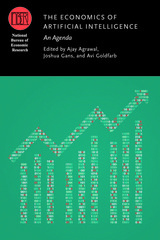
Contributors:
Daron Acemoglu, Massachusetts Institute of Technology
Philippe Aghion, Collège de France
Ajay Agrawal, University of Toronto
Susan Athey, Stanford University
James Bessen, Boston University School of Law
Erik Brynjolfsson, MIT Sloan School of Management
Colin F. Camerer, California Institute of Technology
Judith Chevalier, Yale School of Management
Iain M. Cockburn, Boston University
Tyler Cowen, George Mason University
Jason Furman, Harvard Kennedy School
Patrick Francois, University of British Columbia
Alberto Galasso, University of Toronto
Joshua Gans, University of Toronto
Avi Goldfarb, University of Toronto
Austan Goolsbee, University of Chicago Booth School of Business
Rebecca Henderson, Harvard Business School
Ginger Zhe Jin, University of Maryland
Benjamin F. Jones, Northwestern University
Charles I. Jones, Stanford University
Daniel Kahneman, Princeton University
Anton Korinek, Johns Hopkins University
Mara Lederman, University of Toronto
Hong Luo, Harvard Business School
John McHale, National University of Ireland
Paul R. Milgrom, Stanford University
Matthew Mitchell, University of Toronto
Alexander Oettl, Georgia Institute of Technology
Andrea Prat, Columbia Business School
Manav Raj, New York University
Pascual Restrepo, Boston University
Daniel Rock, MIT Sloan School of Management
Jeffrey D. Sachs, Columbia University
Robert Seamans, New York University
Scott Stern, MIT Sloan School of Management
Betsey Stevenson, University of Michigan
Joseph E. Stiglitz. Columbia University
Chad Syverson, University of Chicago Booth School of Business
Matt Taddy, University of Chicago Booth School of Business
Steven Tadelis, University of California, Berkeley
Manuel Trajtenberg, Tel Aviv University
Daniel Trefler, University of Toronto
Catherine Tucker, MIT Sloan School of Management
Hal Varian, University of California, Berkeley

A timely investigation of the potential economic effects, both realized and unrealized, of artificial intelligence within the United States healthcare system.
In sweeping conversations about the impact of artificial intelligence on many sectors of the economy, healthcare has received relatively little attention. Yet it seems unlikely that an industry that represents nearly one-fifth of the economy could escape the efficiency and cost-driven disruptions of AI.
The Economics of Artificial Intelligence: Health Care Challenges brings together contributions from health economists, physicians, philosophers, and scholars in law, public health, and machine learning to identify the primary barriers to entry of AI in the healthcare sector. Across original papers and in wide-ranging responses, the contributors analyze barriers of four types: incentives, management, data availability, and regulation. They also suggest that AI has the potential to improve outcomes and lower costs. Understanding both the benefits of and barriers to AI adoption is essential for designing policies that will affect the evolution of the healthcare system.
READERS
Browse our collection.
PUBLISHERS
See BiblioVault's publisher services.
STUDENT SERVICES
Files for college accessibility offices.
UChicago Accessibility Resources
home | accessibility | search | about | contact us
BiblioVault ® 2001 - 2024
The University of Chicago Press









